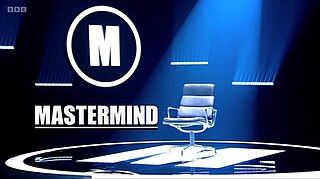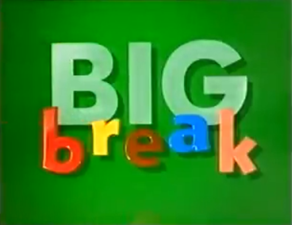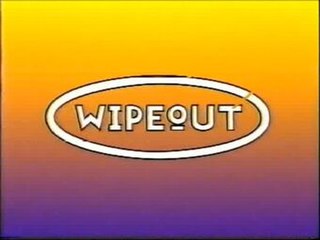
The Weakest Link is a British television quiz show, mainly broadcast on BBC Two and BBC One. It was devised by Fintan Coyle and Cathy Dunning and developed for television by the BBC Entertainment Department. The game begins with a team of nine contestants, who take turns answering general knowledge questions within a time limit to create chains of nine correct answers in a row. At the end of each round, the players then vote one contestant, "the weakest link", out of the game. After two players are left, they play in a head-to-head penalty shootout format, with five questions asked to each contestant in turn, to determine the winner.
The Generation Game is a British game show produced by the BBC in which four teams of two people from the same family, but different generations, compete to win prizes.

Mastermind is a British television quiz show for the BBC, currently presented by Clive Myrie. Its creator, Bill Wright, drew inspiration from his experiences of being interrogated by the Gestapo during World War II. The show features an intimidating setting and challenging questions. Four contestants face two rounds, one on a specialised subject of the contestant's choice, the other a general knowledge round.
Call My Bluff is a British panel game show based on the short-lived US version of the same name. It was originally hosted by Robin Ray and later, most notably, by Robert Robinson. Its most prominent panellist was Frank Muir. The theme music for the show was Ciccolino by Norrie Paramor.
Blankety Blank is a British comedy game show which started in 1979 and is still running today, albeit with some sizeable gaps.

Big Break is a British game show that aired on BBC1 from 30 April 1991 and 10 August 2002 and hosted by Jim Davidson with John Virgo as referee. The programme focuses on teams consisting of a contestant and a professional snooker player competing in rounds that involve snooker, with the best team eventually seeing its player seeking to win prizes for their contestant.

Fame Academy was a British television talent competition to search for and educate new musical talents. The winner received a chance to become a successful music artist and part of the international franchise Star Academy known under various titles in various countries.

A Question of Sport is a British television sports quiz show produced and broadcast by the BBC. It was the "world's longest running TV sports quiz". Following a pilot episode in December 1968, broadcast only in the north of England, the series ran from 1970 until production ceased in 2023. The final presenter was Paddy McGuinness, with team captains Sam Quek and Ugo Monye.

Eggheads is a British quiz show produced by 12 Yard. It was first broadcast in November 2003 chaired by Dermot Murnaghan. In 2008, Jeremy Vine became joint chair, and subsequently sole chair. The show has inspired three spinoff series: Are You an Egghead? (2008), Revenge of the Egghead (2014) and Make Me an Egghead (2016). There have also been episodes of the regular series featuring teams of celebrities in their own short series, with their own rolling prize fund.
Pop Quiz was a British television quiz programme that originally aired on BBC1 from 4 July 1981 to 28 December 1984 with a Top of the Pops special on 4 January 1994 hosted by Mike Read. It was then revived from 21 May to 9 July 1994 on the same channel but this time hosted by Chris Tarrant. It was revived again on Red TV from 14 June to 30 August 2008 with Mike Read returning as host; he also hosted two specials on BBC Four in December 2016 and January 2017.
Going for Gold is a British television game show that originally aired on BBC1 between 12 October 1987 and 9 July 1996. It was revived for Channel 5 from 13 October 2008 to 20 March 2009.
Get Your Own Back is a British children's television game show created by Brian Marshall. Each episode staged a contest between teams of children – attempting to score as many points as possible – and their respective adults – attempting to make tasks as difficult as possible for their child contestants – playing a variety of games. The winning child earns a right to get revenge on the adult by ejecting them into a tank of gunge; adult contestants in the show are somewhat embarrassing, for a variety of reasons, to their child counterparts.
Angellica Bell is a British television and radio presenter, best known for her presenting on CBBC between 2000 and 2006. She is also known for providing occasional cover on The One Show and for co-presenting The Martin Lewis Money Show. Bell won the 2017 series of Celebrity MasterChef.

The Saturday Show is a British children's television series that aired on BBC One from 22 September 2001 to 3 September 2005. It was the replacement for Live & Kicking and contained a mix of audience participation, cartoons, games and gunge. The initial presenters were Dani Behr and Joe Mace, who were replaced in 2002 and by Fearne Cotton and Simon Grant. In 2004, Cotton left and Grant was joined by Angellica Bell and Jake Humphrey, who made up the final team of presenters until the programme finished in September 2005.

Who Wants to Be a Millionaire? is a British television quiz show, created by David Briggs, Steven Knight and Mike Whitehill for the ITV network. The programme's format has contestants taking on multiple-choice questions based upon general knowledge, winning a cash prize for each question they answer correctly, with the amount offered increasing as they take on more difficult questions. If an incorrect answer is given, the contestant will leave with whatever cash prize is guaranteed by the last safety net they have passed, unless they opt to walk away before answering the next question with the money they had managed to reach. To assist in the quiz, contestants are given a series of "lifelines" to help answer questions.
Today's the Day was a British television daytime quiz programme that was broadcast on BBC2 from 12 July 1993 until 12 March 1999. The programme was originally hosted by Andrew Rawnsley until he was replaced by Martyn Lewis.
This is a summary of the year 2007 in British television.
This is a list of British television related events from 2000.

Wipeout was a British television quiz show for BBC One, based on the original American programme of the same name. First shown on 25 May 1994, it ran for nine series: the first four of which aired at primetime and were hosted by Paul Daniels; and the last five at daytime and hosted by Bob Monkhouse, with the final episode airing on 17 April 2003, 8 months before Monkhouse died on 29 December 2003.
This is a timeline of the history of the broadcasting of children’s programmes on BBC Television.








